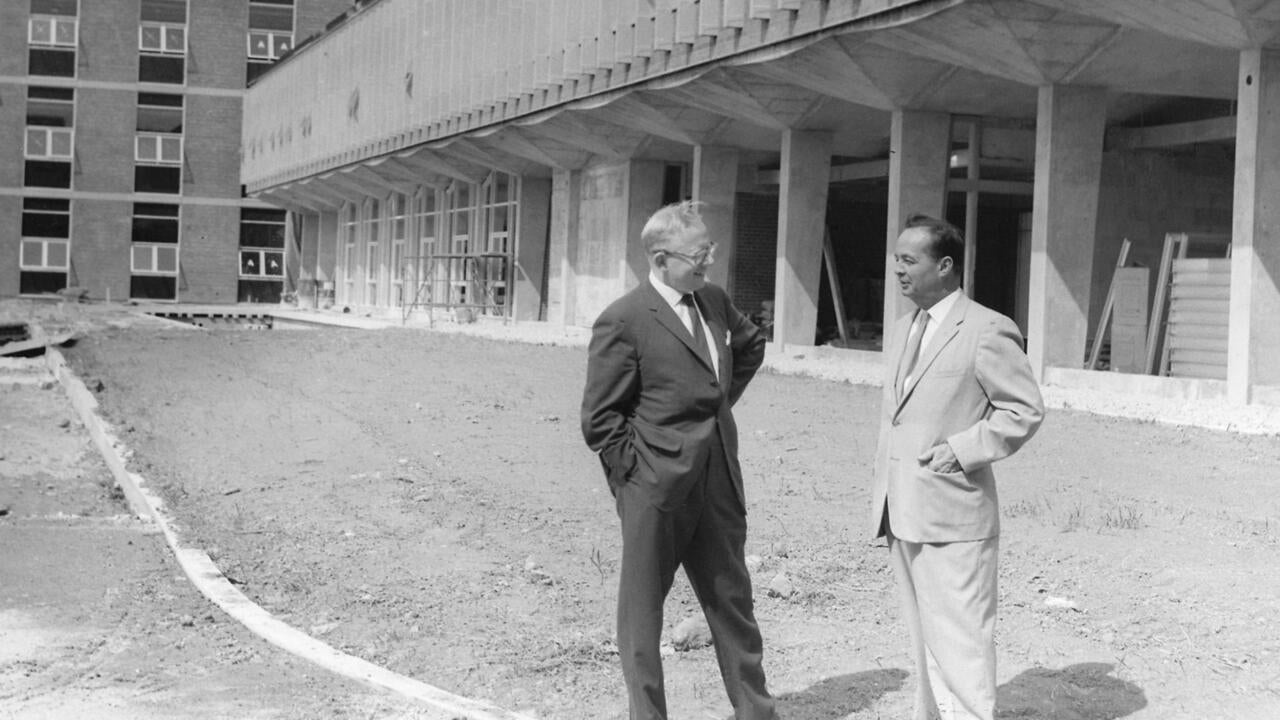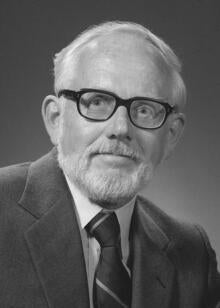
Douglas Wright was godfather to this high-tech region
Record newspaper editorial highlights the lasting impact of the first Waterloo Engineering dean on his community and beyond

Record newspaper editorial highlights the lasting impact of the first Waterloo Engineering dean on his community and beyond
By The Waterloo Region RecordDouglas Wright was the first dean of Waterloo Engineering and the third president and vice-chancellor of the University of Waterloo. He died last week at the age of 92.
The following editorial was published in The Waterloo Region Record. It is reposted here with permission.
*****
The University of Waterloo that greeted Douglas Tyndall Wright in 1958 was a distinctly unimpressive place.
Consisting of an old farmhouse, two temporary structures and a single new building on the edge of prime agricultural land, the year-old institution lacked both the grandeur of Canada’s older universities and their reputations as bastions of higher learning.
That suited Wright perfectly. He’d come to teach engineering, a department he’d take over as dean the following year. He wanted to make his own history, not live someone else’s. And he wanted a blank slate.

Douglas Wright was the first dean of Waterloo Engineering.
He found one in Waterloo. And on that blank slate Wright, who died last week at the age of 92, helped create a top-notch university with three of the world’s best computer, engineering and mathematics schools.
It is also true that as much as anyone, Wright, who was UW’s president from 1981 to 1993, established Waterloo Region as a high-tech mecca. If not for him, we might be just one more past-its-prime, manufacturing region struggling to escape North America’s rust-belt — instead of being the western terminus of “Silicon Valley North.”
The genius of Wright was that he was not satisfied with being a superlative academic; he was driven to make his university an agent of progress. That desire was shaped by his studies at the University of Toronto with Second World War veterans trying to find their way in peacetime. He came to understand what they’d been through in that earth-shattering conflict and why, together, they needed to build a new Canada.
And so he helped do this, one department, then one university and finally one community at a time. Wright may not have originated either UW’s co-op program or its initially controversial decision to grant professors ownership rights over their intellectual property. But it was Wright who created the environment where both policies thrived.
More than many of his peers then, as well as now, Wright realized how a vibrant, symbiotic relationship between academia and industry could serve everyone’s interests.
As generations of UW students gained invaluable workplace experience to earn their degree, they opened the eyes of employers to how much UW grads had to offer. As Wright encouraged UW professors and alumni to create and lead their own businesses, the era of “spinoffs” was born along with a whole new market sector in this region. Meanwhile, the Institute for Computer Research, which was started during his presidency, opened the door for private businesses to benefit from the breakthroughs being made at UW.
Today there are more than 700 startups, spinoffs and mature companies that have UW engineering faculty students, faculty, staff or alumni as founders. To pick just one example, OpenText, one of Canada’s largest software companies, came out of UW when Wright was president. Nor should it be forgotten how influential Wright was in helping a young Mike Lazaridis develop the company first known as Research In Motion and later as BlackBerry. And that fuelled a revolution in global communications.
Tour the UW campus sometime soon. Try imagining what Wright saw in 1958. Reflect on the vision and tenacity it took for him to build and plan so much of what is there now. And look at what surrounds that old farmhouse. More than any plaque or statue ever could, all this speaks to his legacy.
Because Wright was happily retired for decades, many people today don’t recognize his name. That’s a pity. If you live in Waterloo Region, indeed if you live in Canada, you owe him a vote of thanks.

Read more
Redefining capstone learning by bringing students, faculty and community partners together to tackle real-world challenges

Read more
Here are the people and events behind some of this year’s most compelling Waterloo stories

Read more
A winter holiday message from President Vivek Goel
The University of Waterloo acknowledges that much of our work takes place on the traditional territory of the Neutral, Anishinaabeg, and Haudenosaunee peoples. Our main campus is situated on the Haldimand Tract, the land granted to the Six Nations that includes six miles on each side of the Grand River. Our active work toward reconciliation takes place across our campuses through research, learning, teaching, and community building, and is co-ordinated within the Office of Indigenous Relations.